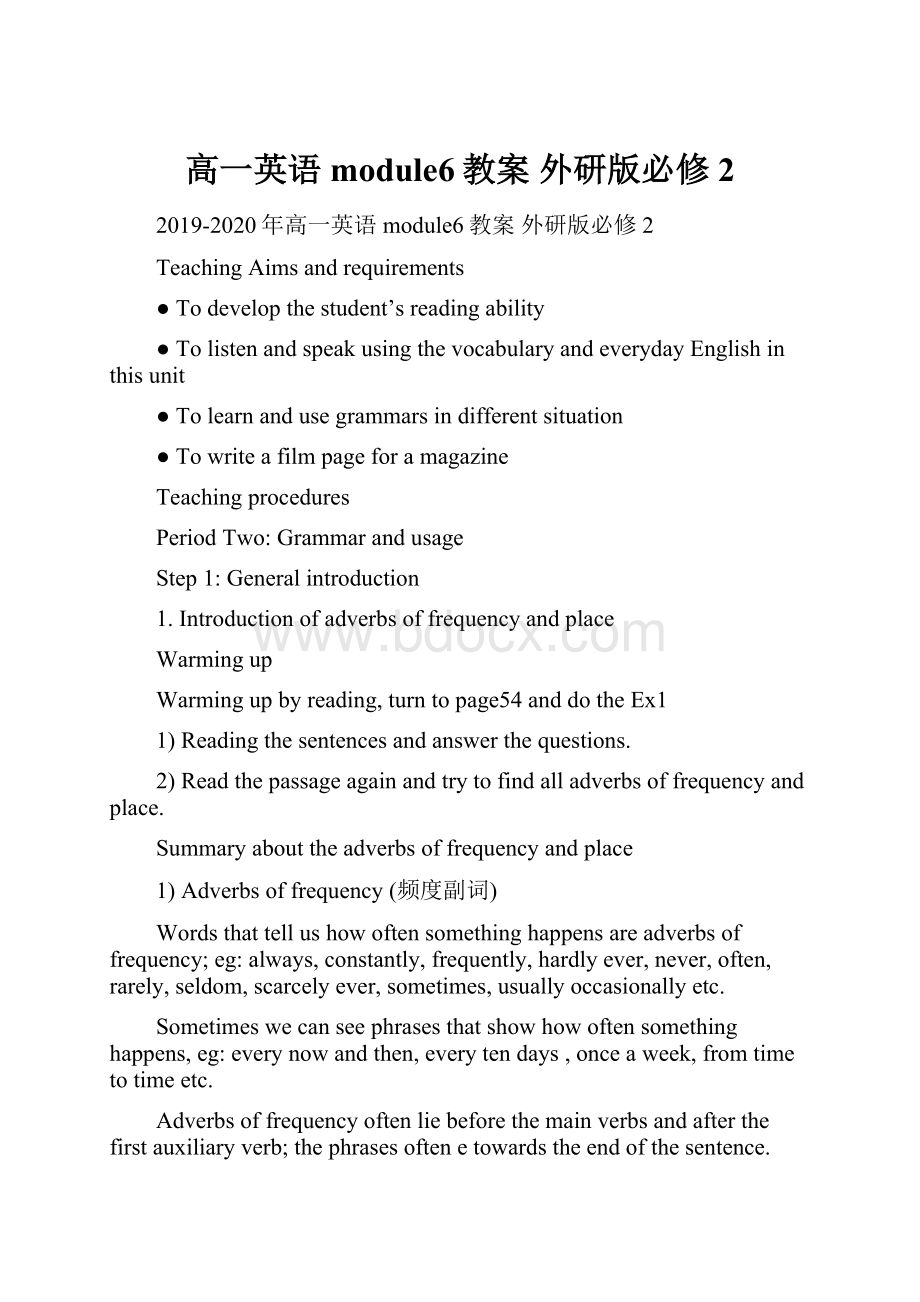高一英语 module6教案 外研版必修2.docx
《高一英语 module6教案 外研版必修2.docx》由会员分享,可在线阅读,更多相关《高一英语 module6教案 外研版必修2.docx(16页珍藏版)》请在冰豆网上搜索。

高一英语module6教案外研版必修2
2019-2020年高一英语module6教案外研版必修2
TeachingAimsandrequirements
●Todevelopthestudent’sreadingability
●TolistenandspeakusingthevocabularyandeverydayEnglishinthisunit
●Tolearnandusegrammarsindifferentsituation
●Towriteafilmpageforamagazine
Teachingprocedures
PeriodTwo:
Grammarandusage
Step1:
Generalintroduction
1.Introductionofadverbsoffrequencyandplace
Warmingup
Warmingupbyreading,turntopage54anddotheEx1
1)Readingthesentencesandanswerthequestions.
2)Readthepassageagainandtrytofindalladverbsoffrequencyandplace.
Summaryabouttheadverbsoffrequencyandplace
1)Adverbsoffrequency(频度副词)
Wordsthattellushowoftensomethinghappensareadverbsoffrequency;eg:
always,constantly,frequently,hardlyever,never,often,rarely,seldom,scarcelyever,sometimes,usuallyoccasionallyetc.
Sometimeswecanseephrasesthatshowhowoftensomethinghappens,eg:
everynowandthen,everytendays,onceaweek,fromtimetotimeetc.
Adverbsoffrequencyoftenliebeforethemainverbsandafterthefirstauxiliaryverb;thephrasesoftenetowardstheendofthesentence.
2)Adverbsofplace(地点副词)
Wordsthattelluswheresomethinghappensareadverbsofplace,eg:
above,below,up,down,here,there,upstairs,downstairs,anywhere,everywhere,elsewhereetc.
Somephrasesalsocantelluswheresomethinghappens,eg:
inthewest,betweenthehouses,attheendoftheroadetc.
Adverbsofplaceandphrasesoftenetowardstheendofthesentence.
TheNMETtests(相关高考题):
1)Imustbegettingfat.Ican_____domytrousersup.(NMETxx)
A.fairlyB.hardlyC.nearlyD.seldom
2)Ifyoucan’tetomorrow,we’ll______havetoholdthemeetingnextweek.(NMETxx)
A.yetB.evenC.ratherD.just
3)MrSmithusedtosmoke______buthehasgivenitup.(xx天津)
A.seriouslyB.heavilyC.badlyD.hardly
4)Everyonewasontimeforthemeeting--_______Chris,who’susuallytenminuteslateforeverything.(xx湖南)
A.butB.thatC.evenD.yet
5)Thegreatsuccessofthisprogrammehasbeen______duetothesupportgivenbythelocalbusinessmen.(xx广东)
A.ratherB.veryC.quicklyD.largely
(Keys:
1---5BDBCD)
2.Introductionofadverbsandadverbialphrases
Adverbscanmodifyverbs,adjectives,adverbs,prepositions,mostofadverbsaremadefromadjectivesandthesuffix〝ly〞.
Adverbialphrasescantelluswhen,where,andhowsomethinghappens.Theadverbialphrasesoftimecanbeplacedatthebeginning,inthemiddle,orattheendofthesentence;adverbialphrasesthattellushowsomethinghappensandadverbialphrasesofplacemostlylieattheendofthesentence.
TheNMETtests(相关高考题):
Correctthemistakesinthefollowingsentences.
1.Shecalled119immediate.(xx福建)
2.Althoughthesefewwordssoundsimpleenough,theyhaveclearpointedoutofthecausesofthepopulationexplosion.(xx广东)
3.Eveningcamedown,wespentthenightinahotelatthetopofthemountain.(xxNMET)
4.Shelookedatmeseriousandsaid,“It’sbadtotelllies!
”(xx天津)
5.IworkedharderbecauseIwasafraidoflosingthejob.(xx辽宁)
(Keys:
1immediate改为immediately2clear改为clearly3down去掉4serious改为seriously5harder改为hard)
Step2:
Exercisesforconsolidation
1.Multiplechoices
1)—HowdidyoufindyourvisittoDisneyland?
--Ienjoyeditverymuch.Itwas____thanIhadexpected.
AfarmoreinterestedBfarmoreinteresting
CsointerestingDevenmoreinterested
2)–Areyougoingtotheconcert?
--No,theticketare____forus.
AterriblyexpensiveBfartooexpensive
CsomuchexpensiveDhighlyexpensive
3)ThankGod,youfinallyarrived_____.YoucanneverimaginehowIworriedaboutyouwhenIwastoldabouttheaccident.
AsafeBaloneCseparatelyDlively
4)—Didyouhaveagoodsleeplastnight?
--Yes,neversleep_____.
AbadlyBbetterCworseDbest
5)—Thepaintonthedoor____hastodryforanothertwodays.
--Yes.Idoubtifthepainterhavereadthedirections_____.
Aalso;stillByet;already
Cstill;yetDeven;yet
6)—LeavingforShanghai?
--_______.
ASoonBLatelyCTheotherdayDSooner
7)—Nowthatyouliketheportablepersonalputersomuch,whynotbuyone?
Itisofgreatusetoyourwork.
--Well,Ican’tafford_____puteratpresent.
AthatexpensiveaBasuchcheap
CthatanexpensiveDsocheap
8)Youshouldtrytowrite______evenwhenyouarebusy.Asyouknow,practicemakesperfect.
AnowandthenBmoreorless
CsoonerorlaterDhereandthere
9)—Peter,whydidn’tyougototheflowershow?
--Ithinkit’ssomething_____pleasant.
AfarmoreBfarless
CtoomuchDmuchtoo
10)—DoesBilldohisnewjobwell?
--____hisoldjob,I’mafraidthereisnohopeforhim.
ANotbetterthanBNobetterthan
CNotsowellasDNotaswellas
11)—Heis_____abraveman.
--Wecan’tadmirehiscourage_____.
Aactually;verymuchBindeed;tooalot
Creally;toomuchDtruly;abit
12)--_____didyousleeplastnight?
--Isatupreadingtoolatetofallasleep.
AHowlongBWhen
CHowsoonDHow
13)Allbodiesarestrengthenedbytakingexercise.___ourmindsaredevelopedbylearning.
AProbablyBLikely
CSimilarlyDGenerally
14)Itwas____latetocatchabusaftertheparty,thereforewecalledataxi.
AtooveryBmuchtoo
CtoomuchDfor
15)Themeetingisimportanttoeveryone,_____middleschoolstudents.
AspecialBespecial
CspeciallyDespecially
16)—Didalloftheboysgotothecinema?
--No.they_____wenttotheInternetbarinstead.
AalmostBmostlyCneverDnearly
17)Canyoubelievethatin_____arichcountryshouldbe____manypoorpeople?
A.such;suchB.such;so
C.so;soDso;such
18)—Didthemedicinemakeyoufeelbetter?
--No.Themore_____,_____Ifeel.
AmedicineItake;theworse
BItakethemedicine;theworse
CmedicineItake;andtheworse
DItakemedicine;worse
19)Helooks____pastsixty.
AquiteBveryCwellDmuch
20)—Canmanflyintheskylikebirds?
--Itis_____impossible.
AveryBquiteCratherDfairly
(Keys:
1—5BBABC6—10AAABB11—15CDCBD16—20BBACB)
2.Putthewordsinthesentencesbelowinthecorrectorder.Payattentiontotheorderofadverbial.
1)aIofsupermarketatyesterdayspentlotmoneythe
2)streetwalkeddownmanthequicklythe
3)wellyouyesterdayplayed
4)workedtodaystudentshardthehave
5)herbeforecarefullytalkthinkyouto
6)thewereloudlyyesterdayboyscorridorthetalkingin
7)intodrovemorningairporttheytheearlythe
8)playsthehappilychildbedroomeveryinhisevening
9)yesterdayMrs.cleanedcarefullyWangthehouse
10)daytheeachstudentstopwaitstopquietlybusatthe
Keys:
1)Ispentalotofmoneyatthesupermarketyesterday.
2)Themanwalkeddownthestreetquickly.
3)Youplayedwellyesterday.
4)Thestudentshaveworkedhardtoday.
5)Thinkcarefullybeforeyoutalktoher.
6)Theboysweretalkingloudlyinthecorridoryesterday.
7)Theydrovetotheairportintheearlymorning.
8)Thechildplayshappilyinhisbedroomeveryevening.
9)Mrs.Wangcleanedthehousecarefullyyesterday.
10)Thestudentswaitquietlyatthebusstopeachday.
Step3:
Homework
Writeareviewofafilmyouhaveseen.Followtheseinstructions.
1.Chooseafilmyouwouldliketowriteabout.
2.Writeoneortwosentencesaboutthesettingofthefilm.
3.Writeaparagraphabouttheplot.
4.Writeaboutthemaincharacterandtheactorswhoplaythem.Sayifyouthinktheactorsaregoodorbad.
5.Giveyourfinalopinionofthefilm.
Apossibleversion
Trustisasvitalforhumanrelationshipasbreathistolife.ItwasaconclusionbyanactressinthefilmcalledLANTANA.Shedoubtedlovewasmoreimportantthantrust.
Theactresswasaphysician,whosejobwaslisteningtotheplaintsofherclientsabouttheirtroubledprivatelife.Shehadtwoclients.Onewasagay.Shewassuspiciousthatthegayhadarelationshipwithherhusband.Thefilmdidn’tshowhoweshedevelopedsuchanimagination.Buthermarriagewasshadowedbyheryoungdaughter’sdeath.Bothsheandherhusbandneverovercamethesorrowthedeathhadbroughtandherhusbandfeltangerthatsheshouldwriteahitnovelaboutthetragedy.
Thefilmisanaward-winningAustralianfilm.That’swhyIfisheditfromapileofposhAmericanmovies.Mypassionforso-calledartisticfilmsdoesn’talwaysrivaloverthatforHollywoodones,simplybecauselotsoffilmswhichareseenasartforart’ssakecouldsucceedinleavingmebewilderedandundertheimpressionthatmymoneyispletelywasted.Butthisfilmisgood,atleastgoodforthestyleoftellingastory.
2019-2020年高一英语module6教案2外研版必修2
一.题材内容及学习目的
本模块话题是“电影和电视节目”,阅读课文为影评。
通过本模块的学习,使学生能用新学词汇、句型等基础知识,围绕话题开展厅、硕、读、写活动,能正确看待电影、电视的功能,并通过影视作品增长知识、丰富生活。
二.教学目标
1.语言知识
语音感叹句的语音
词汇MODULEFILE,VOCABULARY
语法Adverbsoffrequencyandplace
Adverbsandadverbialphrases
功能Talkingabouthowoftenyoudothings
话题从背景、情节、角色、演员和评论等方面讨论电影
2.语言技能
听能听懂广播、电视中比较简单的英语节目。
说能在老师指导下参与角色扮演等活动并能正确使用语音、语调。
读能连贯、流畅地朗读课文,并能根据上下文猜测生词的意思。
写能够描述简单的人物或事件并表达自己的见解。
3.学习策略
认知将新学过的和已经学过的有关电影、电视的词汇、短语进行归纳和整理,类比记忆,通过观察例句,分析和总结出频度副词的使用规律,在口语和书面语中正确运用。
调控根据本模块阅读部分所提问题,学习整体把握文章的主旨大意,提高阅读效率。
资源学会通过观看好的电视节目扩大知识面,获取有效信息,促进科学文化知识的学习。
4.文化意识
大致了解并比较我国和西方国家在影视方面的主要情况、特点和风格;学会通过影视作品学习语言,了解文化。
5.情感态度
学会有选择地欣赏电影或电视节目,获取有效信息,促进科学文化知识的学习。
三.教学重点和难点
1.重点:
(1)用新学词汇、句型等基础知识,围绕话题开展听、说、读、写活动。
(2)语法:
A:
Adverbsoffrequencyandplace
B:
Adverbsandadverbialphrases.
(3)阅读中能推断新学词汇、短语的意义。
2.难点:
用英语进行电影评论。
四.教学方法
运用任务性教学途径,围绕核心任务,设定小任务。
围绕文章内容,设计听、说、读、写活动,尽可能地提供训练学生技能的机会。
开展促进自主性学习的课堂活动,强调合作探究与独立思考相结合。
五.教学安排
根据本模块内容特点、目标任务,以及学生学习英语的规律和特